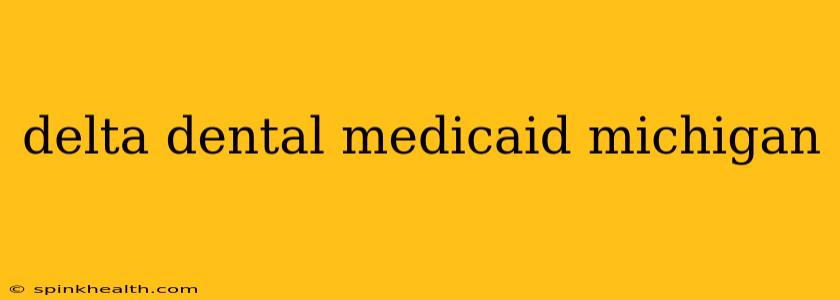Navigating Delta Dental and Medicaid in Michigan: A Comprehensive Guide
Finding affordable dental care can be a challenge, especially when juggling Medicaid and private insurance like Delta Dental. This guide aims to clarify the relationship between Delta Dental and Michigan's Medicaid program, answering common questions and providing helpful information for those seeking dental coverage. My goal is to provide clarity and empower you to make informed decisions about your dental health.
Let's begin our journey by understanding the landscape of dental coverage in Michigan. Imagine this: you're a resident of Michigan, relying on Medicaid for healthcare, but you also happen to have Delta Dental coverage through your employer. How do these two systems interact? This is a question many Michiganders face.
Does Delta Dental cover Medicaid patients in Michigan?
This is a crucial question, and the answer is nuanced. Delta Dental, a significant private dental insurer, doesn't directly replace Medicaid coverage. Instead, it works in conjunction with Medicaid in specific situations. Think of it like this: Medicaid is the foundation, providing a basic level of dental care. Delta Dental could act as a supplemental plan, potentially covering services not included in your basic Medicaid benefits. The exact interplay depends on your specific Medicaid plan and any additional Delta Dental coverage you may have obtained through employment or other means.
What dental services are covered by Medicaid in Michigan?
Medicaid in Michigan covers essential dental services for eligible adults and children. These typically include:
- Preventive care: Regular checkups, cleanings, and fluoride treatments.
- Basic restorative care: Fillings for cavities, extractions of severely decayed teeth.
- Emergency care: Treatment of pain and infections.
However, the scope of services can vary depending on the specific Medicaid plan and the individual's needs. It's crucial to consult your Medicaid plan documents for a complete list of covered services. Remember that Medicaid typically prioritizes preventative care to avoid more extensive and costly treatments later.
Can I use my Delta Dental insurance with my Michigan Medicaid?
The answer to this depends entirely on your specific situation. Some Medicaid plans might allow you to use Delta Dental as secondary insurance, meaning Delta Dental would cover costs after Medicaid has processed its portion of the claim. However, many plans won't allow this kind of dual coverage. To know for sure, you must contact both your Medicaid provider and your Delta Dental provider. They can confirm whether your policies allow for this combined use and how to proceed with filing claims. Do not assume; always verify directly.
How do I find a dentist who accepts both Medicaid and Delta Dental in Michigan?
Finding a dentist who accepts both Medicaid and Delta Dental can simplify the claims process. Both Medicaid and Delta Dental maintain provider directories online. You can search their websites using your zip code to find dentists in your area who participate in both programs. However, finding such a provider isn't always guaranteed. You may need to contact dentists directly to inquire about their acceptance of both types of insurance.
What happens if my dentist doesn't accept Medicaid or Delta Dental?
If your chosen dentist doesn't accept either insurance, you'll likely have to pay out of pocket for your services and then submit claims to your insurance provider to be reimbursed. Medicaid and Delta Dental may have different reimbursement rates, and you may not receive full reimbursement for all expenses. Therefore, it's always beneficial to find a provider in your network whenever possible.
In conclusion, navigating the world of Medicaid and Delta Dental in Michigan requires diligent research and direct communication with your insurance providers. Understanding the nuances of each plan is vital for maximizing your dental benefits and ensuring you receive the care you need. Remember to always verify your coverage directly with the providers. Your oral health is important – don't hesitate to reach out and ask questions to ensure you’re well-informed.

